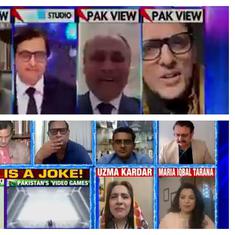Pakistan has mainstreamed terrorism as statecraft, says India at UN
India also criticised Pakistan for its treatment of minority groups.

India on Thursday criticised Pakistan for supporting cross-border terrorism and accused the neighbouring country of not acting on concrete evidence in the 1993 Mumbai serial blasts and the 26/11 terror attack.
“While the whole world, including India, has undertaken proactive steps to promote human rights and build resilience against terrorism, Pakistan has mainstreamed terrorism as statecraft,” Ministry of External Affairs’ Joint Secretary for Counter-Terrorism, Mahaveer Singhvi, said during an online United Nations seminar. “It [Pakistan] continues to provide military, financial and logistical support to cross border terrorism but has denied the victims of terrorism their fundamental right to justice by not acting on the concrete evidences shared by India on several terrorist attacks, including 1993 Mumbai Serial Blasts and 2008 Mumbai Terror Attack.”
Singhvi claimed that terror masterminds who have been proscribed by the United Nations continue to receive support from the Pakistani government.
India also hit out at Pakistan for repeatedly bringing up Jammu and Kashmir at UN. ”Jammu and Kashmir has been, is and will continue to remain an integral part of India and Pakistan should cease to covet it,” Singhvi said. “What is portrayed by Pakistan is actually state sponsored cross border terrorism. India reiterates that despite the continued proxy war and state sponsored cross border terrorism raged by Pakistan against the people of Jammu and Kashmir, the people of Jammu and Kashmir have reposed their faith in the Indian democracy.”
Also read:
- Pakistan to remain on global terror-financing watchdog FATF’s ‘grey list’, say reports
- As US report accuses Pakistan of harbouring terrorists, UN says it expects members to fulfil duties
India also criticised Pakistan for its own treatment of minority groups. “Also, Pakistan’s attempt to masquerade as a promoter of human rights and egalitarianism is farcical considering its record of systemic persecution of its minorities, including Christians, Ahmadiyyas, Sikhs, Hindus, Shias, Pashtuns, Hazaras, Sindhis, and Balochis through draconian blasphemy laws, forced conversions and marriages and extrajudicial killings,” Singhvi added. “The world doesn’t need lessons on human rights from a country whose own citizens as well as minorities have never enjoyed true democracy. The least Pakistan could do, therefore, is to look into its own sorry state of affairs and put its house in order before pointing fingers at others and spewing venom against the democratically elected Indian government and its leaders.”
Pakistan has been facing increasing global criticism for failing to check terror activities. Last month, global terror-financing watchdog Financial Action Task Force had said that it would keep Pakistan in the “grey list” for failing to check the flow of funds to terror groups like Lashkar-e-Taiba and Jaish-e-Mohammed.
Pakistan was put on FATF’s “grey list” in 2018 and given a 27-point action plan to implement in order to be taken off the list. In October 2019, the watchdog indicted Pakistan for failing to deliver on 22 out of 27 targets. The task force also warned Pakistan that it would be blacklisted if it failed to achieve set targets to check terror financing by February 2020.









